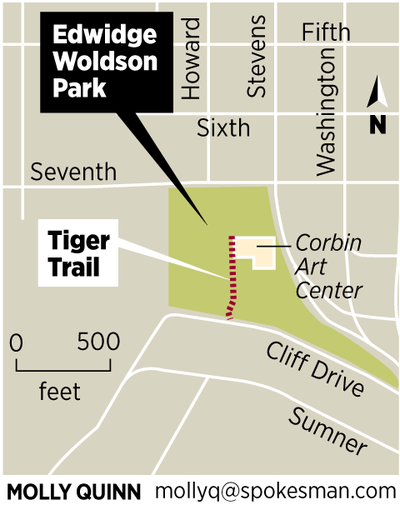Spokane City Council considers changes to Tiger Trail

The Tiger Trail on Spokane’s South Hill may be no more.
The Spokane City Council may put $25,000 toward a study looking at replacing the 84-year-old uneven pedestrian path with a paved pedestrian and bicycle commuter trail. Funding for the study, which council members still are considering, could take a year to secure and would be matched by the city’s parks department.
Neighborhood activists support the plan, saying it will complement their efforts to cut down on crime in the area. They are proposing to create the city’s third alcohol impact area, which could place restrictions on the sale of some alcohol.
Councilman Jon Snyder, who is in favor of creating a non-motorized commuter path on the South Hill, said he anticipated pushback similar to what the city faced when it proposed widening and paving the Ben Burr Trail in the East Central neighborhood. That trail project, which will connect Liberty Park to the University District and Centennial Trail, is fully funded and should be complete within a year. Some East Central residents called the planned trail a “bike freeway,” and said the project will destroy the character of the trail.
Snyder, though, believes the new trail would offer the best way to get up the hill, especially compared to the current state of Tiger Trail, which is part handmade staircase, part rocky trail.
“It’s so hard finding ADA-accessible ways up and down the South Hill,” he said, referring to the Americans with Disabilities Act. “It’s a very challenging route. The idea would be to connect Cliff Drive to Howard Street. Once you get to Howard you have bike lanes, which go downtown and to Riverfront Park. Once you get to Cliff, you can get to lower Manito Boulevard and beyond.”
Still, Snyder said the level of concern about crime on the Tiger Trail could convince opponents of the need for a more popular and better-lit path.
“The crime and activity concerns are getting to a point where people are frustrated and more open to trying a different strategy,” Snyder said. “A new trail would be well-lit, so people can use it when it’s dark. There’d be enough commuter traffic there, so we think it could be a really compelling project.”
Patricia Hansen, chairwoman of the Cliff-Cannon Neighborhood Council, said Snyder and Councilman Mike Allen had talked to her about the possible replacement of Tiger Trail.
“In general, we are absolutely in support of preserving historical places. Tiger Trail is a historical place,” Hansen said. “If the end result is a more positive result, I can’t imagine there’s going to be opposition from the neighborhood council.”
The level of noise and litter problems near Tiger Trail at Edwidge Woldson Park on Cliff Drive persuaded the city last month to increase police patrols and move several large boulders to prevent parking along the scenic boulevard.
Monique Cotton, parks department spokeswoman, said the city was concerned with trash being left at the site and thrown over the cliff. Since the boulders were moved, parks staff have noticed a decrease in trash left in the area, Cotton said.
“We’re committed to doing what we can to improve the neighborhood,” Cotton said.
Hansen said the neighborhood council places blame for the nuisance issues on the Zip Trip convenience store at West 10th Avenue and South Walnut Place.
“It became clear that there were some issues with fortified beer and alcoholic products being sold at the Zip Trip,” she said. “What we discovered was since the downtown alcohol impact area has been in place and enforced, it’s pushed the problem out to other neighborhoods.”
Hansen said the impromptu parties on Cliff Drive get their booze from the store.
“It’s just a direct line from the Zip Trip,” Hansen said. “There’s pretty significant partying going on up there.”
Earlier this month, the neighborhood council sent a letter to the Zip Trip corporate office in Spokane Valley asking that the South Hill location stop selling high-alcohol, low-cost beer.
A request for comment from Zip Trip was not immediately returned Friday.
If the store doesn’t respond by July 11, Hansen said, the neighborhood will work with the state Liquor Control Board to implement an alcohol impact area on the South Hill. Similar areas exist downtown and in East Central, preventing the sale of certain types of “fortified” alcoholic beverages and restricting container sizes with the goal of reducing public drunkenness and other related problems.
“It’s just very much in the beginning stages,” Hansen said, referring to efforts to address residents’ concerns. “But by creating a safer, more family-friendly trail, we think it will make it a little safer on that end of the neighborhood.”